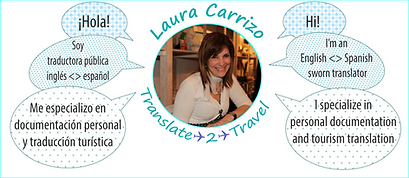The sworn or certified translation is that which will have a legal effect. Therefore, the sworn translator must sign and seal it, thus attesting of its contents. After that, the CTPCBA (Sworn Translators' Association of the City of Buenos Aires / Colegio de Traductores Públicos de la Ciudad de Buenos Aires) will authenticate that signature. This will provide the client with the necessary trust and confidence.
In accordance with section 6 of Argentine Act 20305, any public document to be submitted before public, judicial or administrative bodies in the territory of Argentina must be translated into Spanish by a sworn translator if the document is written in a foreign language.
Public documents comprise, among others, birth, marriage and death certificates, diplomas and academic records, criminal records certificates (good conduct certificates,) passports, driver's licences, ID cards, court orders (such as adoption, divorce or alimony decrees,) powers of attorney, deeds, commercial invoices, contracts, balance sheets, articles of incorporation, by-laws and any other corporate documentation.
Sworn (or certified) translations
As section 7 of the Legalizations Regulations of CTPCBA establishes, "the sworn translation must be preceded by the source document, in original, simple copy or certified copy."
You must be wondering "So, what do I need to have translated? The original of my document, a photocopy or a copy authenticated by a notary public?"
The answer is: It will depend on what the entity to which you have to submit your document wants.
Sometimes, the body that receives your document wants to see the original document and compare it to a simple copy (non-certified photocopy) - they themselves examine both and certify the copy as valid.
Some other times, the body needs to retain the original. In that case, the translation must be stapled to the original source document. However, take into account that Argentine Act 26413, Section 23 stipulates that testimonials, copies, certificates, family booklets or any other documents that correspond to entries made in the directorate general or its dependencies and that bear the signature of a public official and the seal of the respective office conform public instruments and are to be withheld by neither any judicial or administrative authority nor by any entity or private person; instead, either a note of its contents should be taken for the record or a certification of its contents by any reliable and authentic means should be made.
Please note that sometimes it is difficult, tedious and even impossible to obtain copies of a certain document, so leaving it behind could mean never recover it again - for example, diplomas are issued only once (universities do not issue copies,) or the birth certificate of a greatgrandfather issued by a country that does not exist anymore. In this case, it is suggested that a reduced copy (A4 size, for that matter) be made and have it authenticated by a notary public. The signature of the notary public should be legalized by the relevant Notary Publics' Association and then this legalized copy acquires the same legal force as the original. If you should submit this document abroad, it should also be apostilled. This procedure is a little longer but it may save us from losing a valuable document that could be hard to recover.
The sworn translator will translate whatever YOU need: an original, a simple copy (not certified) or a copy authenticated by a notary public. You should find out with the body that requests it what kind of source document you need translated.
Before taking a document for translation, take into account the prior legalizations you will have to get. Click here for more info.
What shall I have translated: the original or just a copy?
If you need the translation of a photocopy, you can proceed as explained in the tag Private translations. The translation will be stapled to the printout of the document sent by email.
If you need the translation of the original or of a certified copy, you can bring the document yourself or send it with a third party. You can also send it with a delivery service. If you don't know any, I can recommend the service I always trust, Cade-Rap: www.caderap.com.ar; Tel.: 4384-8887 int. 208); Email: info@caderap.com.ar. I can get the document either in San Telmo or in the Cancillería (Argentine Ministry of Foreign Affairs) area.
In both cases, once I let you know that the document has been translated, you can pick it in person or a third party (the cost is on the client.)




Once the document has been translated, take into consideration the legalizations you may need afterwards. Click here to get more details.


